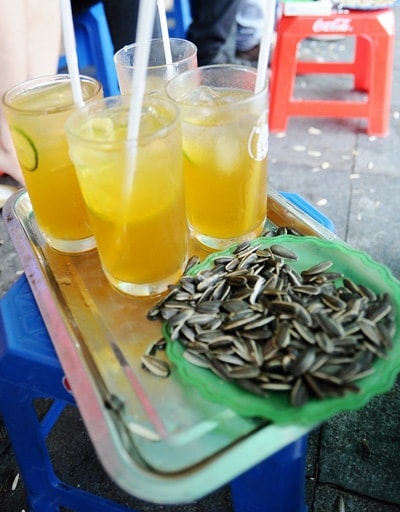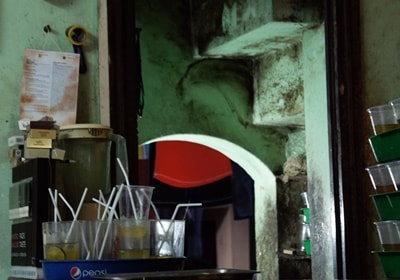Lemon tea is cheap and easy, but is it safe?
Sir, what can you say from your observations about the lemon tea trend that is very popular among young people, especially students, nowadays?
Teaching helps me to be in contact with a lot of students from nearby areas such as Hanoi University of Science and Technology and Hanoi Open University, as well as schools further away.
When classes are over and even during class time, I still see students from upper and lower classes clinging to sidewalks with cups of lemon tea. Eating and drinking on the sidewalk means inviting diseases into oneself.
When observing sidewalk lemon tea shops, I learned that they do not have clean water to wash and rinse cups. Even the straws only need to be rinsed and dried for the next use. Lemon tea is a thirst quencher, you have to drink it when you are thirsty, but whether it is beneficial or not, we have to calculate intelligently and scientifically. Because what you eat and drink greatly affects your health: 90% of diseases enter your body through the mouth.
Could you please tell us more about the advantages and disadvantages of sidewalk lemon tea?
Sidewalk lemon tea is not a bottled drink, it is not managed and inspected. Bottled products themselves are not necessarily good for health. Bottled water is simply drinking water, mixed with flavorings to make it easier to get into the body. Bottled water has no nutrition and we spend a larger amount of money than regular filtered water just to get water into the body more easily.
With regular tea, used in families is a good drink because tea leaves contain vitamins. Regularly providing tea to the body also brings good antioxidants. But lemon tea is not used with regular brewed tea but they use tea powder.
To sell cheap drinks, Chinese tea powder will bring high profits. Chinese food industry extract soluble substances into tea powder. Tea powder is not the usual tea extracted from tea leaves but using waste and old tea leaves. Then, they put it into the machine to dry and crush. When making lemon tea on the sidewalk, researchers like us also understand that it is not brewed with purified water or boiled water.
In addition to using tea powder, the tea scrub also uses chemical sugar: 1 kg of chemical sugar can replace 400 kg of regular sugar. And just take a sip of sidewalk lemon tea and you can clearly taste the chemical sugar, do not be mistaken, you are drinking water mixed with regular sugar.
In addition, each cup of lemon tea also uses fragrance. Synthetic fragrances must always be strictly controlled. But even in countries famous for strictly controlling fragrances such as Japan, France, the US... sometimes, there are still a few cases of "overdoing" in the use of fragrances, causing harm to consumers.
And the fragrances used in lemon tea at such a cheap price are not controlled fragrances at all. There are more than 400 different organic substances that can be mixed to create aromatic substances. And these substances must be tested on mice. If the toxicity rate on mice is 1, then when used on humans, it should only be at 0.2.
What risks and diseases will continuous use of sidewalk lemon tea bring, sir?
If you drink a lot, it will cause chronic poisoning, which means that the poisoning will take place over a long period of time, also known as chronic poisoning. The introduction of aromatic substances into the human body at a high density will accumulate and be localized in the body.
Flavorings and aromas currently exist in three forms: liquid, solid, and gas. The aromas used in lemon tea shops are mostly in solid form (pulverized). Many toxins are created from the aromas themselves.
The World Health Organization has a long list of substances that are allowed to be introduced into the human body, but must be within certain limits. You cannot remember or calculate how many cups of lemon tea you have drunk and how many flavors have been stored in your body. A simple problem: Quantity changes, substance changes. That is the cause of disease.
When toxins lurk in your body, they cause various diseases. Most of the diseases are related to infection. Using unfiltered water, water contaminated with heavy metals can affect the bones, brain. Lead and mercury poisoning are of course dangerous.
Deciding on the dosage also requires young people to be wise and intelligent. Even drinking coffee is very normal, but if you drink a large amount, it is not simple, the body will be in trouble. There are cases where people can commit suicide by drinking a large amount of coffee. So you need to use food and drink wisely.
Using unsanitary brewing processes creates the shortest path for spreading diseases from one person to another. That is not to mention social diseases, when lemon tea is a time-consuming trend of young people, attracting many participants, it is easy to spread bad habits, influencing each other. If you "chat" all afternoon with someone in a gloomy mood, your day will not be bright.
Thank you!
"Kitchen" of lemon tea shops
Find a way to ask for the restroom to go into the "kitchen" area of lemon tea shops. Or with sidewalk lemon tea shops, just choose a table very close to the mixing area, you will witness many things with your own eyes.
The result of observing the surface is that you will see a lot of dirty water cans and water containers everywhere. And no one can guarantee 100% that the drinking water poured into hundreds of cups of lemon tea every night (of a tea shop) is boiled water.
Using your mobile phone, you can record evidence of people turning on tap water, from tap water to water cans, and then carrying it straight to the brewing point. There will be a small amount of hot water used to make tea, the rest is all tap water.

And of course, when using ice (even "clean ice" is never made from boiled water, or purified water). So you have a cup of lemon tea with the perfect "collection" of tap water, from water to ice.
In the lemon tea area, you can still sometimes see large boxes of tea with buds displayed next to boxes of tamarind juice and sour plum juice. But most of them are just beautiful "shows", the real ingredients to make thousands of cups of tea every night are tea powder, not the tea that families drink every day (which is 3 or 4 times more expensive).
Tea powder is sold in many wholesale markets at a super cheap price: only about 30,000 - 40,000 VND/kg. The recipe of lemon tea shops in Hanoi is basically the same: Tea powder, flavoring powder (some places use scented water), lemon scent, lemon slices and... tap water.
If you survey these tea powders at Dong Xuan market, Hang Bo, you will see big and small bags stacked in rows. The bags are divided by weight: small bags are 0.5 kg, large bags are 5 kg. And all are imported from China.
According to dantri - VP






